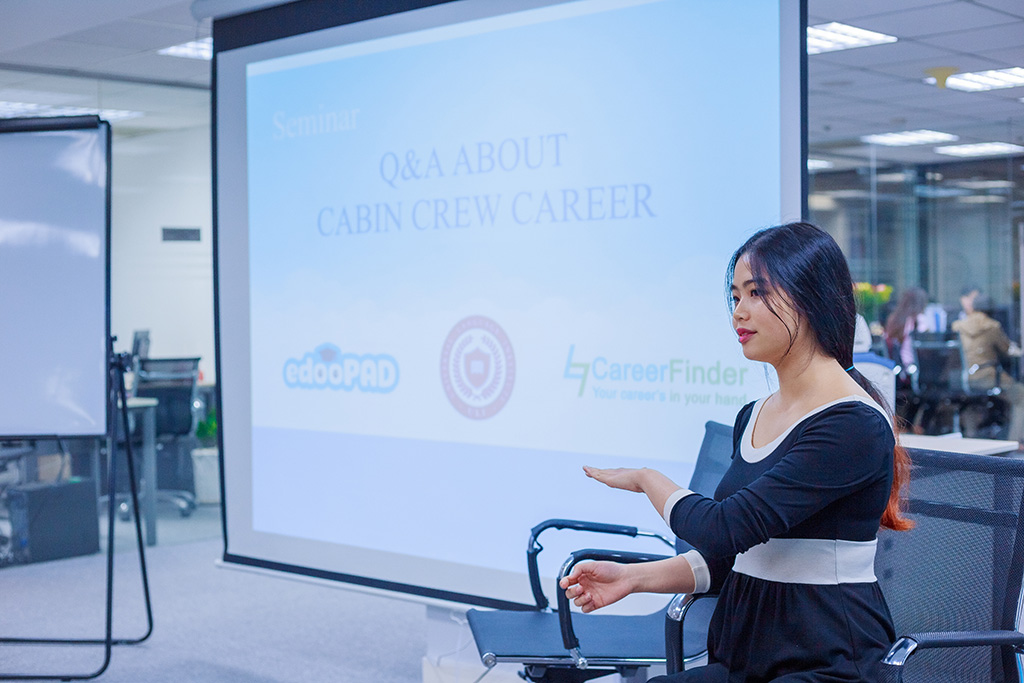Q & A tuyển cabin crew hãng Emirates Airline, Q&A tuyển tiếp viên hàng không hãng Eva Air
Những câu hỏi bạn cần hỏi khi phỏng vấn tiếp viên hàng không
Tại sao nên đặt câu hỏi khi phỏng vấn tiếp viên hàng không

Phỏng vấn tiếp viên hàng không là một cuộc phỏng vấn đặc thù vì nó được ứng tuyển bởi một lượng lớn ứng viên đến từ nhiều nơi khác nhau (quốc gia, quốc tịch khác nhau) cho cùng 1 vị trí là cabin crew. Trong quá trình phỏng vấn có thể người phỏng vấn sẽ hỏi bạn có câu hỏi gì đặt cho họ không. Nếu bạn ngập ngừng không trả lời thì khá tệ đấy. Bạn nên hỏi và vấn đề là nên hỏi gì bây giờ vì nếu hỏi không đúng còn tệ hơn là không hỏi. Tất nhiên đa số ứng viên sẽ chọn cách an toàn là không hỏi hoặc hỏi những câu chung chung. Điều đó sẽ tạo lợi thế rất lớn cho ứng viên viên nào biết cách hỏi và đây là bí quyết để bạn vượt qua buổi phỏng vấn tiếp viên hàng không bằng cách đặt câu hỏi cho người phỏng vấn.
Các câu hỏi dưới đây được sưu tầm từ những chuyên gia trong ngành nhân sự và được tôi biên tập lại. Nó chỉ là những câu hỏi không hơn nếu bạn chỉ xem nó. Hãy biến nó thành vũ khí khi phỏng vấn bằng cách cá nhân hoá chúng thành của bạn.
Đặt câu hỏi ngược lại mang lại cho bạn lợi ích gì?
- Thể hiện bạn quan tâm một cách nghiêm túc công việc này
- Bạn là chuyên gia trong lĩnh vực bạn đang ứng tuyển
- Thu hút sự chú ý đến bạn một cách tích cực (điều này cực kỳ cần thiết vì cabin crew là vị trí có cả ngàn ứng viên ứng tuyện 1 đợt)
- Tạo cảm xúc tích cực để người phỏng vấn ra quyết định có lợi cho bạn
- Chuyển từ thế bị động sang chủ động (nhưng phải thật khéo nhé, vì bạn vẫn một ứng viên, và họ vẫn ở “chiếu trên”)

Questions You Should Ask in cabin crew interviews!
Job interviews are all about an employer determining if you’re the right person for the job, right? Wrong. Interviews are also about finding out if a company is the right fit for you.
Có phải phỏng vấn việc làm là hầu hết tất cả nhà tuyển dụng xác định bạn có đúng người đúng việc? Sai rồi, phỏng vấn còn là để tìm ra công ty đó có phù hợp với bạn hay không.
That’s why it’s crucial to know exactly what questions you should ask during any job interview. Luckily, we’ve already come up with 45 questions to help you better prepare for your next interview.
Đó là lý do tại sao rất quan trọng để biết chính xác câu hỏi nào bạn nên hỏi trong suốt quá trình phỏng vấn. Thật may, chúng tôi có sẵn 45 câu hỏi giúp bạn chuẩn bị tốt hơn cho buổi phỏng vấn tiếp theo.
Your role – vai trò của bạn
Be careful not to ask questions already answered in the job description. It’s important go beyond those general duties to understand everything the job entails.
Hãy cẩn thận không đặt những câu hỏi đã được nêu trong bản mô tả công việc. Điều quan trọng là bạn hiểu tất cả những đòi hỏi trong công việc.
1. Can you offer specific details about the position’s day-to-day responsibilities?
2. What would my first week at work look like?
3. How does this position contribute to the organization’s success?
4. What do you hope I will accomplish in this position?
5. How does the company culture affect this role?
6. What job shadowing opportunities are available for an applicant before they accept an offer?
Proceed with caution: If rather than going into detail about the primary responsibilities listed in the job description, the employer rambles off many more duties — they may be asking you to take on more than you initially thought.
Thận trọng khi tiến hành: Nếu thay vì đi vào chi tiết về trách nhiệm chính được liệt kê trong bản mô tả công việc, người phỏng vấn có thể hỏi vu vơ nhiều nhiệm vụ hơn – họ có thể yêu cầu bạn đi vào chi tiết hơn những gì bạn nghĩ ban đầu.
Getting to know the interviewer – Làm quen với người phỏng vấn
Most likely, the interviewer is the first contact you’ll have at this company — they could even be your future boss. Asking questions can help you understand their attitude, company values, and where the company’s future is heading.
Nhiều khả năng, thông thường người phỏng vấn là người đầu tiên bạn sẽ liên lạc tại công ty này – họ thậm chí có thể là quản lý tương lai của bạn (còn với một hãng hàng không thì người phỏng vấn là người sẽ quyết định bạn có đi tiếp hay không trong format tuyển cabin crew).Vì thế đặt câu hỏi có thể giúp bạn hiểu được thái độ của họ, giá trị của công ty, và nơi mà tương lai của công ty là nhóm.
7. What do you enjoy most about working here?
8. Why are you working in this industry?
9. Can you walk me through your typical work day?
10. What is your greatest accomplishment with the company?
11. What is your team’s greatest accomplishment?
12. What goals do you have for the company, yourself, and employees over the next five years?
13. What hobbies do you have outside of the office?
Proceed with caution: Be wary of leaders who have trouble opening up or don’t seem passionate about their company and team.
Thận trọng khi tiến hành: hãy cảnh giác với người đứng đầu có vấn đề về sự cởi mở hay trông không có vẻ đam mệ về công ty và đội nhóm của họ
Management’s style – phong cách quản lý
What type of management style do you need to reach the height of your potential? Now’s the best time to see if the company’s leaders align with your expectations.
Những phong cách quản lý nào bạn cần để tương xứng với tiềm năng của bạn? Bây giờ là thời gian tốt nhất để xem nếu các nhà lãnh đạo của công ty phù hợp với mong đợi của bạn.
14. How do leaders encourage employees to ask questions?
15. How do leaders set employees up for success?
16. How does employee feedback get incorporated into day-to-day operations?
17. How does management deliver negative feedback to employees?
Proceed with caution: Employers who can’t list how they encourage employees and set them up for success may not deliver the support you’re looking for in a company.
Thận trọng khi tiến hành: Nhà tuyển dụng không thể liệt kê ra cách họ lên tinh thần nhân viên và khiến họ thành công thì không thể cung cấp sự hỗ trợ cần thiết như bạn trông đợi ở công ty này
Company culture – văn hoá công ty
From benefits and perks to the ways employees interact with each other, not meshing with a company’s culture can put a roadblock on your path to success.
Từ phúc lợi và đặc quyền đến cách các nhân viên tương tác lẫn nhau, không có sư gắn kết trong văn hoá công ty có thể đặt một rào cản trên con đường thành công của bạn
18. What is your work culture like?
19. How would you describe the work environment here?
20. What benefits are focused on work-life balance?
21. What benefits and perks does the company offer?
22. What is the outline of your telecommuting policy?
23. How frequently do employees make themselves available outside of normal working hours?
Proceed with caution: Listen closely to how the interviewer describes the company’s benefits and environment to be sure it’s the right culture for your personality and working style.
Thân trọng khi tiến hành: Lắng nghe kỹ càng cách mà người phỏng vấn mô tả phúc lợi và môi trường làm việc của công ty để chắc chắn về văn hoá công ty tốt cho nhân cách và phong cách làm việc của bạn
Company reputation
After doing some research, you should already know a few things about the company’s reputation. Now it’s time to dig a little deeper to make sure this is a place where you’ll thrive.
24. What’s your mission statement?
25. How often is a new hire the result of a previous employee quitting?
26. Why do most employees leave the company?
27. How would employees describe the company and its leaders?
28. What are the company’s biggest problems? How are they overcoming them?
29. What do you want the company to be known for among employees — past, present, and future?
Proceed with caution: Quality leaders will be the first to admit that their company isn’t perfect. Interviewers who claim they would change nothing might be failing to grow and make positive changes.
Performance measurements
Knowing a company’s expectations and how they measure goals before accepting a job offer helps you decide if their style matches with what motivates you.
30. How are employees recognized for their hard work?
31. How involved are employees in the structuring of their own goals and tasks?
32. What are your views on goals, timelines, and measuring success?
33. How often are employees expected to provide status updates on a project?
34. How often do you evaluate employee performance?
Proceed with caution: Wanting constant updates and control over employee tasks are warning signs of a micromanager.
Future co-workers
The employees at this organization could be your next team. Make sure you’re positive this is a group you want to be a part of.
35. Can you tell me about the team I’ll be working with?
36. How competitive are your employees?
37. How do you develop teamwork skills among employees?
Proceed with caution: A competitive environment can be fun and motivating, but a lack of teamwork in the office could point to a cutthroat company.
Opportunities for growth
What is your ultimate career goal? Set yourself up for success by finding out how far this new position could take you on your career path.
38. What type of mentor system do you have in place?
39. What type of educational/training opportunities does the company offer?
40. What advancement opportunities are available?
41. How do leaders promote employee growth and success?
42. What does it take to be a top performer at this company?
Proceed with caution: If an interviewer is unable to share how you can advance within the company, chances are you might not be able to grow at the rate you want.
Moving forward
Don’t leave the interview with any questions unanswered — for you or the interviewer. This is your final opportunity to make sure you’re both on the same page before you walk out the door.
43. What’s the next step of this process, and when can I expect to hear from you?
44. Is there any other information I can provide you with?
45. Would you like to see more examples of my work?
Proceed with caution: Interviewers who don’t have a lot to offer on next steps may already have another candidate in mind or might not be in a big rush to hire. Remember to stay positive and continue to job search until you’re officially hired.

